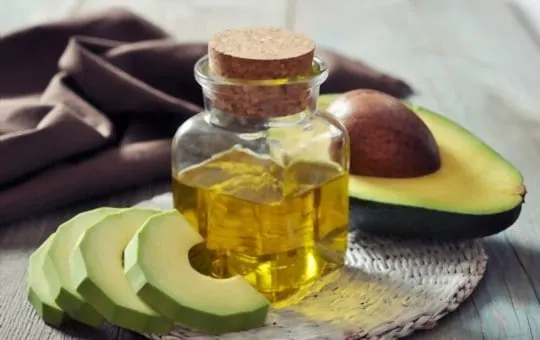Swapping out coconut oil in your favorite recipes isn’t just possible; it’s a game changer.
We’re here to spill the beans on the top five substitutes that keep your meals delicious and healthy.
Ever run out of coconut oil right before cooking? No stress!
These alternatives work wonders in any dish.
From baking to frying, we’ve got you covered.
Each substitute brings its own unique flair.
And the best part?
You probably have some of these in your kitchen right now.
Ready to kick your dishes up a notch?
Let’s dive into the world of kitchen hacks with these five stellar coconut oil substitutes.
What is Coconut Oil?

Coconut oil has been used for centuries as a natural remedy for various health conditions.
It has become increasingly popular as a cooking oil and skincare product in recent years.
Unlike other oils, coconut oil is composed mostly of medium-chain fatty acids, which the body can easily convert into energy.
Additionally, coconut oil contains lauric acid, a substance that has been shown to have antibacterial and antimicrobial properties.
Coconut oil can be used in various ways, including being applied to the skin or hair or used in cooking.
When used topically, coconut oil can help to improve skin health and reduce inflammation.
When used in cooking, it can help to boost metabolism and promote weight loss.
Coconut oil is a versatile and healthy addition to any diet or beauty routine.
The 5 Best Substitutes for Coconut Oil
For those who love the taste and texture of coconut oil but are looking for a healthier option, few substitutes are available.
| Substitute | Key Characteristics | Substitute Ratio |
|---|---|---|
| Butter | Creamy texture, rich flavor | Use an equal amount of butter as a substitute for coconut oil in recipes |
| Olive Oil | Smooth texture, mild flavor | Use an equal amount of olive oil as a substitute for coconut oil in recipes |
| Grapeseed Oil | Neutral flavor, high smoke point | Use an equal amount of grapeseed oil as a substitute for coconut oil in recipes |
| Sunflower Oil | Light flavor, high smoke point | Use an equal amount of sunflower oil as a substitute for coconut oil in recipes |
| Avocado Oil | Rich flavor, high smoke point | Use an equal amount of avocado oil as a substitute for coconut oil in recipes |
When looking for healthier choices and in need of substitutes for coconut oil, consider these five options:
1 – Butter

Coconut oil is a healthy fat with many benefits, but it can be expensive.
Butter, on the other hand, is a more affordable option.
When substituting butter for coconut oil, it’s important to keep a few things in mind:
- Butter has a higher water content than coconut oil, so you need to use less butter in your recipe.
- Butter has a lower melting point than coconut oil, so it’s important to melt the butter completely before adding it to your recipe.
- Because butter is a dairy product, it will add a richer flavor to your dish.
To substitute coconut oil with butter, simply use an equal amount of butter in your recipes.
For example, if a recipe calls for 1 tablespoon of coconut oil, use 1 tablespoon of butter instead. Keep in mind that butter contains dairy and may alter the taste and texture of your dishes.
2 – Olive Oil

Olive oil is a staple in many kitchens, but did you know that it can also be used as a coconut oil substitute? Unlike coconut oil, olive oil has a low smoke point, meaning it can burn easily when heated.
However, this quality also makes it ideal for sautéing or stir-frying.
When used in place of coconut oil, olive oil will give your food a lighter flavor.
Additionally, olive oil is a good source of healthy monounsaturated fats, while coconut oil is mostly composed of saturated fat.
So if you’re looking for a healthier option, olive oil is a great choice.
Use the same amount of olive oil as you would coconut oil in your recipes.
For example, if a recipe calls for 1/4 cup of coconut oil, use 1/4 cup of olive oil instead. Olive oil adds a healthy fat option to your dishes.
3 – Grapeseed Oil

Grapeseed oil is a type of vegetable oil extracted from the seeds of grapes.
It is relatively high in polyunsaturated fats and has a light, neutral flavor.
For these reasons, grapeseed oil is a popular ingredient in many cooking applications.
However, it is also increasingly being used to replace coconut oil.
Coconut oil has long been hailed for its health benefits, but it is also a solid at room temperature and can be difficult to work with.
On the other hand, Grapeseed oil remains liquid even when refrigerated, making it easier to use in many recipes.
In addition, grapeseed oil has a higher smoke point than coconut oil, meaning that it can be used for higher-temperature cooking without the risk of burning.
Use an equal amount of grapeseed oil as a substitute for coconut oil in your recipes.
For example, if a recipe calls for 2 tablespoons of coconut oil, use 2 tablespoons of grapeseed oil instead.
4 – Sunflower Oil

There has been a recent trend of sunflower oil substituting for coconut oil.
This is most likely because sunflower oil is cheaper to produce than coconut oil.
In addition, sunflower oil has a higher smoke point than coconut oil, making it better suited for cooking at high temperatures.
However, there are some drawbacks to using sunflower oil as a substitute for coconut oil.
Sunflower oil is less stable than coconut oil, meaning it is more likely to go rancid.
It also has a higher PUFA content, potentially contributing to inflammation.
Nevertheless, sunflower oil does have some advantages over coconut oil, and it is likely to continue to be used as a substitute in the future.
Use an equal amount of sunflower oil as a substitute for coconut oil in your recipes. For example, if a recipe calls for 1/2 cup of coconut oil, use 1/2 cup of sunflower oil instead.
5 – Avocado Oil

One oil that is becoming increasingly popular in the kitchen is avocado oil.
Avocado oil has a neutral flavor that makes it versatile in both savory and sweet dishes.
Additionally, it has a high smoke point, making it ideal for cooking at high temperatures.
Perhaps most importantly, avocado oil is rich in healthy fats and antioxidants, making it a healthier option than some other types of oils.
If you’re looking for a versatile oil that can be used for everything from frying to baking, avocado oil is a great option.
Use an equal amount of avocado oil as a substitute for coconut oil in your recipes. For example, if a recipe calls for 3 tablespoons of coconut oil, use 3 tablespoons of avocado oil instead.
Conclusion
In conclusion, these are five of the best substitutes for coconut oil that you can use in your cooking and baking.
Each one has its own unique set of benefits, so be sure to choose the one that best suits your needs.
If you’re looking for a healthier option, avocado oil is a great choice.
If you need something more budget-friendly, olive oil is a good option.
And if you want something that has a similar flavor to coconut oil, grapeseed oil or sunflower oil are both excellent choices.

The 5 Best Substitutes for Coconut Oil
Ingredients
- Butter
- Olive Oil
- Grapeseed Oil
- Sunflower Oil
- Avocado Oil
Instructions
- Pick your favorite substitute from the list above.
- Follow cooking directions for your selected substitute with the proper ratio of ingredients.

Andrew Gray is a seasoned food writer and blogger with a wealth of experience in the restaurant and catering industries. With a passion for all things delicious, Andrew has honed his culinary expertise through his work as a personal chef and caterer.
His love for food led him to venture into food writing, where he has contributed to various online publications, sharing his knowledge and insights on the culinary world. As the proud owner of AmericasRestaurant.com, Andrew covers a wide range of topics, including recipes, restaurant reviews, product recommendations, and culinary tips.
Through his website, he aims to inspire and educate fellow food enthusiasts, offering a comprehensive resource for all things food-related.

Leave a comment